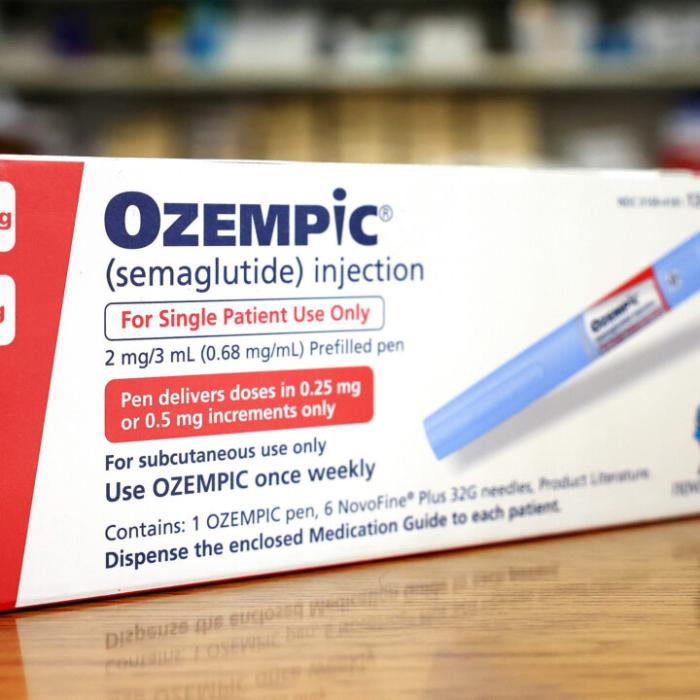Pharmacy leaders have urged people not to buy fake weight-loss jabs, which are readily available online, as they said shortages of Ozempic are expected to stretch into next year.
Ozempic is only currently available on the NHS for people with type 2 diabetes while rival Wegovy can be prescribed for weight loss via specialist services, although only for those with a BMI over 30 with at least one obesity-related health condition.
However, the so-called “skinny jabs” can be easily obtained online, particularly through social media sites, where they have been heavily promoted by celebrities and “influencers” who have shared stories of their weight loss success since taking the self-injectable drugs.
Now, the National Pharmacy Association (NPA) has warned of a possible “explosion in the unlicensed sale of medication online,” with people purchasing Ozempic and Wegovy (both brand names of the generic drug, semaglutide) from unlicensed sellers.
Sales Expected to Double This Year
Ozempic, made by Danish company Novo Nordisk, was originally manufactured for people with type 2 diabetes to regulate their blood sugar levels but its ability to suppress appetite has led to it being repurposed as a weight loss drug, gaining huge popularity in the United States and then worldwide.This has led to a shortage of the drug for those with diabetes while also fuelling a rise in counterfeit jabs—which have sometimes been found not to contain any of the active ingredient needed to balance blood sugar.
Novo Nordisk is, this week, expected to report sales in the region of £7.7 billion for the two drugs in the second quarter of 2024—almost double the sales for the same quarter of 2023.
The NPA, which represents more than 5,000 independently-run community pharmacies, is urging patients to speak to their pharmacist or GP instead of buying medicines online from sellers who are not registered and regulated in the UK.
It also warned that problems obtaining Ozempic are likely to continue into next year.
Nick Kaye, chairman of the NPA, told the PA news agency: “Pharmacists remain deeply concerned that the current medicine shortages crisis could lead to an explosion in the unlicensed sale of medication online.
“Stocks of Ozempic are very depleted in community pharmacies in the UK and it is important that these remain prioritised for those in the most clinical need.
“Given the precarious state of supply of this and other vital medication, there is a much greater risk of people looking to order in supplies from disreputable online vendors.”
He added that while stocks of Wegovy are not “too bad,” currently, fresh stock of Ozempic is not expected until December 27 at the earliest.
In January, the Department of Health and Social Care told healthcare providers not to prescribe the drugs off-label for weight loss, and said existing stock must be reserved for patients with type 2 diabetes.
Off-Label Prescribing
Kaye said, “We don’t know how prevalent off-label prescribing is but we do know (it happens). And we really worry about the fakes within the supply chain.“People want to access these drugs and when they can’t because they’re out of stock, they can end up going elsewhere.”
He added that the NPA is not calling for all online sales to be banned, but instead wants a reintroduction of rules that make it mandatory for a list of regulated online UK medicine sellers to be publicly available.
Such rules were scrapped in the UK following Brexit.
Kaye advised people to check whether their online provider is registered and regulated by the General Pharmaceutical Council or Pharmaceutical Society of Northern Ireland.
In June, the World Health Organisation issued a medical product alert over fake semaglutide stocks detected in Brazil, the UK and the US.
The genuine versions of the drugs are certainly not without side effects, however. In the United States, the Food and Drug Administration has warned that some users are accidentally overdosing, with reports of severe nausea, vomiting, headache, exhaustion, dehydration, pancreatitis and gallstones.
On social media, many users of the blockbuster drug known as GLP-1 agonists have reported undesirable side effects, including cosmetic ones, such as severely slackened skin and so-called, “Ozempic face.”
It is usual to start with the lowest dose, before moving up to a higher dose if necessary.
A Department of Health and Social Care spokesman said: “We strongly advise the public not to buy regulated medicines from unauthorised online retailers or beauty salons as they could be dangerous.
“The Medicines and Healthcare products Regulatory Agency (MHRA) continuously works to identify those unlawfully trading in medicines and will use its powers to take appropriate enforcement action, including, where necessary, prosecuting those who put people’s health at risk.
“Separately, we are taking action to tackle the obesity crisis head-on—shifting our focus from treatment to prevention—which will ease the strain on the NHS and helping people to live well for longer.”
The MHRA last week approved the use of Wegovy to reduce the risk of obese adults suffering from serious heart problems or strokes, in a further expansion of the drug’s use.
It was also reported last week that a trial at Imperial College, London, found the use of the weight-loss drug could help stave off dementia—although only for a few months, with larger studies needed to confirm the initial findings.







